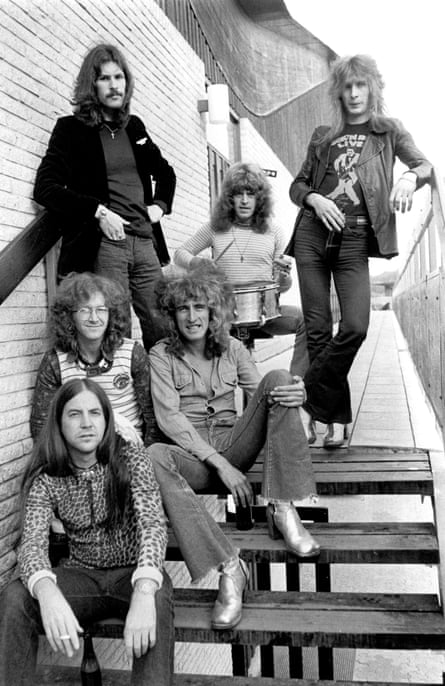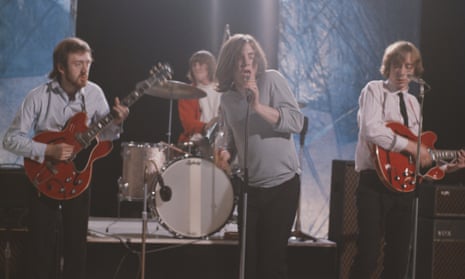Two years ago, I interviewed Phil May and Dick Taylor of the Pretty Things in the restaurant of a London hotel. Before the pair arrived, I sat chatting with the band’s manager, Mark St John, a man who clearly adored his charges, but did little to underplay what hard work managing them could be. “They have a completely enveloping understanding of mayhem, with zero attention to detail, really undisciplined,” he said. “They really are the most unprofessional fucking band.”
It’s the kind of thing managers are wont to say to journalists, attempting to grub up some hype for a hot new band, to convince the writer he’s about to meet ungovernable young agents of insurrection and disorder. But the Pretty Things were not a hot new band: by the time I met them, they had been going for 55 years. May was 74, Taylor 75.
And nor was it hype: the Pretty Things really did have an enveloping understanding of mayhem, which seemed to have engulfed their career from the first moment they set foot on a stage. They had the war stories to prove it: the horror with which their defiantly snotty approach to playing R&B had been greeted by the reverential denizens of the UK’s early 60s blues revival; the 60s gigs that had ended in riots, or with the band being escorted out of town by the police, or, in one particularly memorable incident, being deported from New Zealand. Some former band members proved unable to cope with the unending turmoil of life in the Pretty Things – not just the riots and the unwelcome attentions of the authorities, but their penchant for creating “musical anarchy” onstage and their chaotic relationship with the music business itself – and had gone mad, or simply vanished, only to resurface years later, selling life insurance.
May in particular seemed to delight in being wilfully confrontational. Even before the band had begun, he had grown his hair down to his shoulders, a remarkable thing for a man in early 60s Britain to do, which led to him being spat at in the street. He had pre-empted the band’s deportation from New Zealand by loudly questioning the treatment of the country’s indigenous Maori population. He had not only thrown himself headlong into the psychedelic experimentation of the flower power era, he had written songs about it that were so blatant, no one could possibly miss their meaning. “I need LSD,” he sang, on a 1965 track called, wait for it, LSD, followed up with another track called Tripping.
Nor was he much more circumspect about his bisexuality, swapping the gender pronouns in the band’s old R&B covers – “I’m in love with your little girl and your little boy’s in love with me,” he hollered on their version of Mama Keep Your Big Mouth Shut – and writing the astonishing 1967 single Defecting Grey, a song about cruising in a park while on acid. In the best possible way, Phil May genuinely didn’t appear to give a fuck, and at least one member of their audience was watching very closely and picking up tips: David Bowie, a die-hard Pretty Things follower, wrote May’s phone number in his address book under the name “God”.

Their superb early singles were, by some distance, the rawest-sounding music any British band had yet released, given an extra frisson by the sheer screw-you attitude audible in May’s vocals. Take the relentless, thrilling Rosalyn, or Midnight To Six Man, a paean to the life of a jobbing musician so evocative you can almost smell the sweat and cigarette smoke.
They were ahead of their time, descending into chaotic, free-form, feedback-laden improvisation onstage years before the Velvet Underground or the early Pink Floyd made it their trademark. In 1968’s SF Sorrow, they recorded the world’s first rock opera. You could say that’s a dubious accolade considering some of the self-indulgent claptrap later released under that particular banner, but the album was a masterpiece, teeming with fantastic songs and fresh ideas: at turns, the music on it seems to presage both Krautrock and heavy metal. Like almost everything the Pretty Things released after their first couple of singles, it was a commercial failure – it would take decades for it to find an audience – and Taylor quit the band dispirited by a lack of success that saw them recording library music under an assumed name and appearing alongside Norman Wisdom in the disastrous sex comedy What’s Good For the Goose. May claimed that, during its filming, the band had turned the veteran star onto marijuana.
May doggedly kept going, piloting the Pretty Things through 1970’s equally fantastic Parachute, one of rock’s great expressions of the waning of the 60s dream: thick with harmonies, alternately beautifully bucolic and darkly paranoid and grim. For a moment, it looked like their career might take off in the US – they enjoyed the patronage of Led Zeppelin, signing to their Swan Song label – but it never quite happened, and they split up in 1976, just as punk rock suggested that the world might be coming around to the Pretty Things’ original way of thinking.
They reformed in 1978, recording the new wave-influenced Cross Talk two years later: as if to prove not much had changed in the Pretty Things’ world, it flopped, but May and Taylor carried on playing live and occasionally recording with a fluctuating line-up.
Remarkably, age did not wither them: whoever else was onstage with May and Taylor, the Pretty Things were still as incendiary live as they always had been. The difference was that they were greeted not with opprobrium, but reverence. The legend of their 60s and 70s recordings had mushroomed, and there was an entire garage-rock scene that could trace its roots back to the tough sound of Rosalyn and their early albums The Pretty Things and Get the Picture. More commercially successful peers paid homage by guesting at their shows: when they announced their retirement from electric performances – a decision influenced by May’s emphysema – both Van Morrison and David Gilmour of Pink Floyd appeared onstage at their final live performance.
A band who seemed so out-of-control on arrival that you wouldn’t have bet on them lasting six months before imploding ended up lasting six decades, their reputation for mayhem and provocation always preceding them. It was a reputation of which May seemed rather proud: “I don’t think we were trying to be surreptitious about anything,” he shrugged that afternoon, with admirable understatement.

